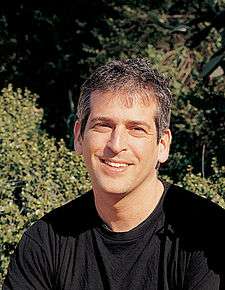Uri Alon
| Uri Alon | |
|---|---|
|
Uri Alon | |
| Born | 1969 (age 46–47)[1] |
| Institutions |
Weizmann Institute of Science Princeton University |
| Alma mater |
Hebrew University of Jerusalem Weizmann Institute of Science |
| Doctoral advisor | David Mukamel[2] |
| Other academic advisors |
|
| Doctoral students | |
| Known for | Network motifs |
| Notable awards | Overton Prize (2004) |
|
Website www | |
Uri Alon (born 1969) is a Professor and Systems Biologist at the Weizmann Institute of Science.[5] His highly cited[6] research investigates gene expression,[7] network motifs[8][9] and the design principles of biological networks[10] in Escherichia coli and other organisms using both computational biology and traditional experimental wet laboratory techniques.[11]
Education
Alon earned his bachelor's and master's degrees from the Hebrew University of Jerusalem and his Ph.D. in Theoretical Physics[2][12] from the Weizmann Institute of Science.
Career
After having his interest in biology sparked, Alon headed for his postdoctoral work at Princeton University in experimental biology returning to the Weizmann Institute as a Professor.
Alon features in several popular videos on YouTube such as Sunday at the Lab (with Michael Elowitz[13] and How to Give a Good Talk.[14] As of 2011, he is the author of the most highly bookmarked scientific paper on CiteULike[15] How To Choose a Good Scientific Problem[16] and How to Build a Motivated Research Group.[17]
Awards
In 2004 Alon was awarded the Overton Prize[3] for "outstanding accomplishment by a scientist in the early to mid stage of his or her career" by the International Society for Computational Biology. Alon has also been awarded:
- Moore Fellowship, California Institute of Technology (2000)
- EMBO Young Investigator Award (2001)
- IBM Faculty Award (2003)
- Minerva Junior Research Group on Biological Computation (2003)
- Morris L. Levinson Award in Biology (2003)
- Teva Founders Prize (2005)
- European Molecular Biology Organization membership (2007),[18]
- Radcliffe Institute for Advanced Study fellow 2009[19]
- HFSP Nakasone Award (2014)[20]
References
- 1 2 "Wis-Find: Author Search Results". weizmann.ac.il.
- 1 2 Alon, U.; Evans, M.; Hinrichsen, H.; Mukamel, D. (1996). "Roughening Transition in a One-Dimensional Growth Process". Physical Review Letters. 76 (15): 2746–2749. arXiv:cond-mat/9512069
 . Bibcode:1996PhRvL..76.2746A. doi:10.1103/PhysRevLett.76.2746. PMID 10060778.
. Bibcode:1996PhRvL..76.2746A. doi:10.1103/PhysRevLett.76.2746. PMID 10060778. - 1 2 "ISCB Newsletter 7-3". iscb.org.
- ↑ Alon Laboratory members and alumni
- ↑ "Homepage - Uri Alon". weizmann.ac.il.
- ↑ Uri Alon's publications indexed by Google Scholar
- ↑ Alon, U.; Barkai, N.; Notterman, D. A.; Gish, K.; Ybarra, S.; Mack, D.; Levine, A. J. (1999). "Broad patterns of gene expression revealed by clustering analysis of tumor and normal colon tissues probed by oligonucleotide arrays". Proceedings of the National Academy of Sciences. 96 (12): 6745–6750. doi:10.1073/pnas.96.12.6745.
- ↑ Milo, R.; Shen-Orr, S.; Itzkovitz, S.; Kashtan, N.; Chklovskii, D.; Alon, U. (2002). "Network Motifs: Simple Building Blocks of Complex Networks". Science. 298 (5594): 824–827. doi:10.1126/science.298.5594.824. PMID 12399590.
- ↑ Shen-Orr, S. S.; Milo, R.; Mangan, S.; Alon, U. (2002). "Network motifs in the transcriptional regulation network of Escherichia coli". Nature Genetics. 31 (1): 64–68. doi:10.1038/ng881. PMID 11967538.
- ↑ Uri Alon (2007). An introduction to systems biology: design principles of biological circuits. Boca Raton: Chapman & Hall/CRC. ISBN 1-58488-642-0.
- ↑ List of publications from Microsoft Academic Search
- ↑ "arXiv.org Search". arxiv.org.
- ↑ "Uri Alon's Song - Sunday at the Lab co-written with Elowitz" on YouTube
- ↑ " How to Give a Good Talk by Uri Alon" on YouTube
- ↑ "CiteULike CiteGeist: Popular Papers". Retrieved 2011-06-09.
- ↑ Alon, U. (2009). "How to Choose a Good Scientific Problem" (PDF). Molecular Cell. 35 (6): 726–728. doi:10.1016/j.molcel.2009.09.013. PMID 19782018.
- ↑ Alon, U. (2010). "How to Build a Motivated Research Group" (PDF). Molecular Cell. 37 (2): 151–152. doi:10.1016/j.molcel.2010.01.011. PMID 20122395.
- ↑ "Uri Alon". f1000.com.
- ↑ Radcliffe Fellows
- ↑ "2014 HFSP Nakasone Award goes to Uri Alon". hfsp.org.
